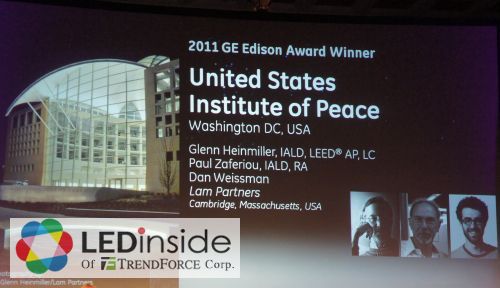The 2011 GE Edison Award is presented to Glenn Heinmiller, Paul Zaferiou and Dan Weissman of Lam Partners for lighting the United States Institute of Peace in Washington, DC, USA. A personalized Steuben crystal award for the winner of this 29th annual lighting design competition was presented by GE Lighting on May 8, 2012 in Las Vegas, Nevada.

The first permanent home of the United States Institute of Peace is prominently located near the Lincoln Memorial in Washington, D.C. The translucent wing-like roofs that connect the building’s three curving sections presented the most challenging lighting problem: to light the roofs with no visible sources so they glow softly both inside and outside. A pervasive lighting theme, featuring GE T5 fluorescent lamps, is present throughout the building. Light sources are fully concealed or designed to disappear, revealing and animating, but never competing with the architecture.
The roofs are comprised of an outer diffusing glass and an inner white membrane, with structure sandwiched between these two layers. Forward-throw cove fixtures, with GE 54-watt T5 3000 K fluorescent lamps, are mounted in the tops of walls to light the roofs. This single lighting layer simultaneously provides the interior ambient lighting and the exterior surface glow. Above the uppermost windows, necklaces of matching adjustable monopoints with GE 37-watt Precise™ IR MR16 halogen lamps and 39-watt ConstantColor® CMH® PAR20 lamps provide supplemental downlighting. In-grade ceramic metal halide adjustable fixtures illuminate the roof’s overhang, seamlessly extending the glow outside to the roof’s lowest point.
Perimeter offices are fully daylighted, and the clerestories bring daylight into the corridors. Inexpensive T5 fluorescent strips with GE 21-watt T5 3000 K lamps are integrated continuously into the curving base of the clerestories to indirectly light both the offices and corridors. In addition, each office has a custom T5 pendant with shielding designed to block views into the fixtures from outside or from within the atria.
A central lighting control system employs occupancy sensing, daylight sensing, scheduling, and local preset scene control. The project is LEED® Gold certified.












